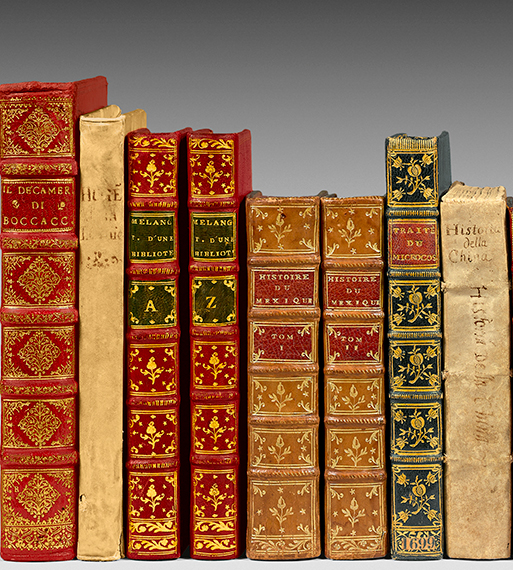Rare edition reviewed and corrected by Bernardin de Saint-Pierre, partially original,
including Paul and Virginie in volume IV, The Wishes of a Solitary, and the philosophical tales of Café de Surate and of The Indian Cottage in volume V.
Provenance : library stamp from Russian library on half-titles,
same provenance stamp on the plates.
Paris, 1792.
Bernardin de Saint-Pierre, Jacques Henri. Studies of Nature.
Paris, Imprimerie de Didot Jeune at Didot, Né de La Rochelle and Senne, 1792.
5 volumes in-12 of: I/ (2) leaves, 1 frontispiece, xxxvi pages, 1 folding plate, 648 pages; II/ (2) leaves, 3 folding plates, 652 pages incorrectly numbered 625; III/ (2) leaves, 595 pages; IV/ (2) leaves, lxxxviii pages, 532 pages; V/ (2) leaves, xxxiv pages, (1) page, 411 pages; and lvi pages, 72 pages, (1) leaf for The Indian Cottage. Red morocco, framed with fillets, piped, stippled, waved, smooth spines decorated with lozenge and large floral designs, decorated cuts, blue moiré lining and endpapers, gilt edges. Binding of the time.
168 x 98 mm.
Edition reviewed and corrected by Bernardin de Saint-Pierre, partly original, including Paul and Virginie in volume IV, The Wishes of a Solitary, and the philosophical tales of Café de Surate and The Indian Cottage in volume V.
Volume 5 is here in original edition.
It is adorned with a frontispiece, drawn by Moreau and engraved by Simonet, a folding map of the Atlantic Hemisphere, and 3 botanical prints.
The impact of the Studies, which saw numerous reprints, brought him, after twenty years of poverty and wanderings, material comfort, social recognition, and even a reputation of a scholar that, rightly or wrongly, posterity has hardly ratified. The title should not mislead: more than a didactic treatise, the work is akin to an essay, even a form of personal literature: “Descriptions, conjectures, insights, views, objections, doubts, and even my ignorances, I’ve gathered everything: and I’ve given these ruins the name of Studies, like a painter does with the studies of a large painting to which he has not been able to put the final touch.”
Exceeding the descriptive science of their time, the Studies thus herald new disciplines like ethology or ecology. But their interest is also literary. One will find highly acute analyses on the voluptuous sense of melancholy and the slightly morbid pleasure that ruins and tombs dispense, as well as splendid depictions of landscapes, among the first in French literature, both precise, colorful, and imbued with a panicked feeling of nature’s power, which, while fitting into the vogue of the “descriptive genre” of the end of the century, foretell Chateaubriand.
Bernardin shares his Opinion on this edition:
“The first edition of this work, which appeared in December 1784, was almost exhausted by December 1785. Since its publication, I have only to congratulate myself on the honorable testimonies of friendship given to me by people of all ranks and both genders, most of whom are unknown to me. Some have come to find me, and others have written me the most touching letters to thank me for my book; as if, by giving it to the public, I had rendered them some particular service. Several of them have invited me to their châteaux, to live in the countryside where I would love to reside, they said. Yes, without a doubt, I would love the countryside, but a countryside of my own, not someone else’s. I responded as best I could to such pleasant service offers, of which I only accepted the goodwill. Goodwill is the flower of friendship; its fragrance lasts forever when left on its stem without being plucked.”
As for the edition, he rightly considers it the best: “For a long time, friends of Literature and Bibliographers desired an edition of the ‘Studies of Nature‘ of a convenient, portable format, and at the same time pleasing in a library; the one we offer today combines all these advantages. It has been very accurately reviewed by the author; special care was given to the correction of proofs and the typographical aspect.“
Beautiful copy.
Provenance: stamp of Russian library on half-titles, same provenance stamp on the plates.

